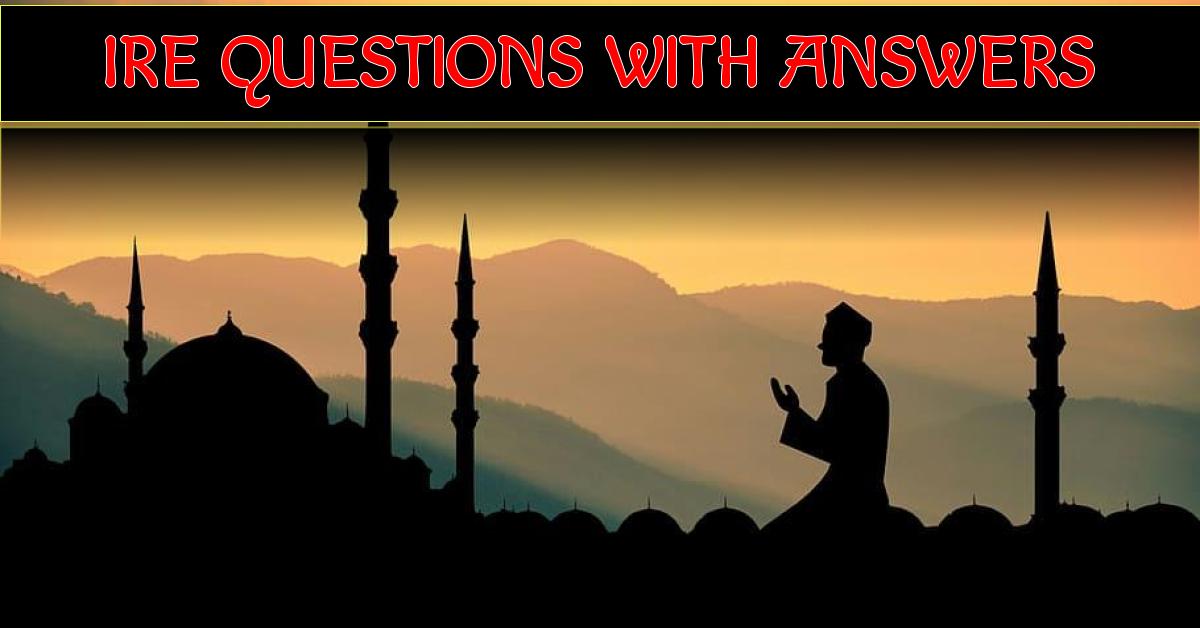KCSE IRE Paper 2 2010 Question 6(b) with Answers and Marking Scheme.(b) Discuss five achievements of Sayyid Qutb. (10 marks)
Achievement of Savyid Qutb
0 Comments
KCSE IRE Paper 2 2010 Question 6(a) with Answers and Marking Scheme.(a) Discuss Uthman Dan Fodio’s contribution to the development of Islam in Northern Nigeria. (10 marks)
Uthman Dan Fodio’s Contribution to the Development of Islam in Northern Nigeria.
KCSE IRE Paper 2 2010 Question 5(c) with Answers and Marking Scheme.(b) Explain five challenges Kenyan Muslims face in education. (10 marks)
Challenges Kenyan Muslims Face in Education.
KCSE IRE Paper 2 2010 Question 5(a) with Answers and Marking Scheme.(a) Discuss five reasons that led to the fall of the Fattimid Dynasty. (10 marks)
Reasons that led to the fall of the Fattimid Dynasty
[object Object]
(c) Mention five contributions of Ali bin Talib to the development of Islam. (5 marks)
Contributions of Ah bin Abi Talib to the development of Islam
KCSE IRE Paper 2 2010 Question 4(b) with Answers and Marking Scheme.(b) State the effects of the Battle of Badr on the Prophet’s mission. (7 marks)
Effects of the Battle of Badr on the Prophet’s Mission
Describe the social conditions prevailing in Makka when Prophet Muhammad (p.b.u.h) was born.21/3/2021 KCSE IRE Paper 2 2010 Question 4(a) with Answers and Marking Scheme.(a) Describe the social conditions prevailing in Makka when Prophet Muhammad (p.b.u.h) was born. (8 marks)
Social conditions Prevailing in Makka when the Prophet was born
KCSE IRE Paper 2 2010 Question 3(c) with Answers and Marking Scheme.(c) State four rules that a Muslim should observe before taking a loan from a bank. (4 marks)
Rules to be observed by a Muslim before taking a loan from a bank
KCSE IRE Paper 2 2010 Question 3(b) with Answers and Marking Scheme.(b) Give six reasons why record keeping is important in business transactions.(6 marks)
Reasons why Record Keeping is Important in Business transactions
Explain five ways in which Muslims in Kenya help in the reduction of poverty in their community.21/3/2021 KCSE IRE Paper 2 2010 Question 3(a) with Answers and Marking Scheme.(a) Explain five ways in which Muslims in Kenya help in the reduction of poverty in their community. (10 marks)
Ways in which Muslims in Kenya help in the reduction of Poverty in their community
KCSE IRE Paper 2 2010 Question 2(c) with Answers and Marking Scheme.(c) State five rights a Muslim girl child. (5 marks)
Rights of the Muslim girl child
KCSE IRE Paper 2 2010 Question 2(b) with Answers and Marking Scheme.(b) Describe five conditions under which polygamy is allowed in Islam. (5 marks)
Conditions under which Polygamy is allowed in Islam
KCSE IRE Paper 2 2010 Question 2(a) with Answers and Marking Scheme.(a) What are the effects of divorce on the children? (10 marks)
Effects of Divorce on Children
KCSE IRE Paper 2 2010 Question 1(c) with Answers and Marking Scheme.(c) State five rules on walking according to Islamic teachings. (5 marks)
Rules on walking according to Islamic teachings
KCSE IRE Paper 2 2010 Question 1(b) with Answers and Marking Scheme.(b) "And those who when they spend, are neither extravagant nor niggardly, but hold a medium (way) between those extremes.” (Quran 25:67).With reference to the above verse from the Quran give five reasons why Islam condemns israaf (extravagance). (5 marks)
Reasons why Islam condemns Israaaf
KCSE IRE Paper 2 2010 Question 1(a) with Answers and Marking Scheme.(a) Give five reasons why Muslims advocate abstinence in the prevention of HIV/AIDS. (10 marks)
Reasons why Muslims advocate Abstinence in the Prevention of HIV/AIDS
KCSE IRE Paper 1 2010 Question 6(c) with Answers and Marking Scheme.(c) State the significance of the Day of Judgement to Muslims. (5 marks)
Significance of the Day of Judgment to Muslims.
KCSE IRE Paper 1 2010 Question 6(b) with Answers and Marking Scheme.(b) State the different manifestations of Shirk-al-Akbar. (5 marks)
Different manifestations of Shirk-al-akbar
KCSE IRE Paper 1 2010 Question 6(a) with Answers and Marking Scheme.(a) Explain five ways in which the Prophets of Allah facilitated divine guidance. (10 marks)
Ways in which the Prophets of Allah facilitated Divine Guidance
KCSE IRE Paper 1 2010 Question 5(b) with Answers and Marking Scheme.(b) Discuss the significance of the freedom of religion to the Muslims in Kenya. (10 marks)
Significance of Freedom of Religion to Muslims in Kenya.
KCSE IRE Paper 1 2010 Question 5(a) with Answers and Marking Scheme.(a) Explain five ways in which Muslims can help promote peace in Kenya. (10 marks)
Ways in which Muslims in Kenya can help promote peace.
KCSE IRE Paper 1 2010 Question 4(c) with Answers and Marking Scheme.(c) Illustrate the recommended steps in the performance of Tayammum. (4 marks)
Recommended steps in the performance of Tayammum.
KCSE IRE Paper 1 2010 Question 4(b) with Answers and Marking Scheme.(b) State six privileges accorded to a Muslim traveller. (6 marks)
The priviledges accorded to a Muslim traveller
KCSE IRE Paper 1 2010 Question 4(a) with Answers and Marking Scheme.(a) Explain the five different types of Saum. (10 marks)
Types of saum
KCSE IRE Paper 1 2010 Question 3(c) with Answers and Marking Scheme.(c) State four ways in which the Swahaba helped in the transmission of Hadith.(4 marks)
Ways in which the Swahaba helped in the Transmission of Hadith.
|
Archives
January 2024
Categories
All
|
Can't find what you are looking for? Don't worry, Use the Search Box Below.
|
Primary Resources
College Resources
|
Secondary Resources
|
Contact Us
Manyam Franchise
P.O Box 1189 - 40200 Kisii Tel: 0728 450 424 Tel: 0738 619 279 E-mail - sales@manyamfranchise.com |

 RSS Feed
RSS Feed

